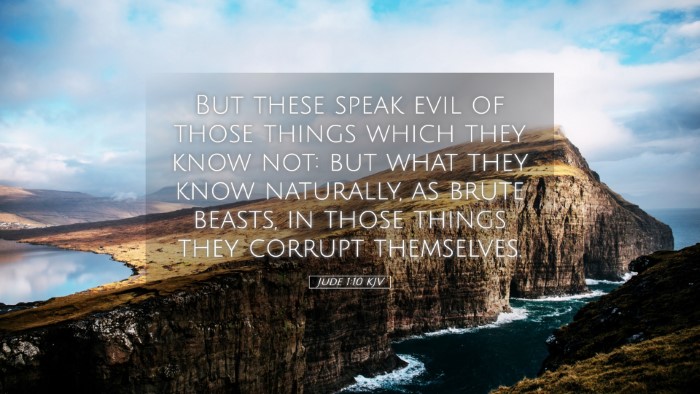Commentary on Jude 1:10
Jude 1:10 reads as follows: "But these speak evil of those things which they know not: but what they know naturally, as brute beasts, in those things they corrupt themselves." This verse serves as a powerful warning against false teachers and highlights the ignorance and moral corruption that often characterizes their behavior. Below, we delve into insights from various public domain commentaries to provide a comprehensive understanding of this verse.
Exegesis and Context
Jude, a brief yet profound epistle, addresses the rise of false teachers and warns the church about their dangerous doctrines. In the immediate context, Jude contrasts the character of these individuals with the godly men of faith. The passage captures a universal principle about humanity's tendency to malign what they do not understand.
Understanding "These Speak Evil"
Matthew Henry notes that "these" refers specifically to apostates—those who have persistently rejected the truth. Their speaking evil indicates a contempt for spiritual matters and divine truths. They lack genuine insight, which leads to destructive attitudes.
Ignorance of Divine Truths
Albert Barnes observes that false teachers' ignorance compels them to speak of things they do not comprehend. This ignorance is not merely intellectual; it is moral and spiritual, leading them to make blasphemous claims against God’s revelation. Their inability to grasp divine truths is indicative of their separation from genuine faith.
The Comparison to Brute Beasts
The apostle Jude uses the phrase "as brute beasts" to illustrate the base nature of these individuals. Adam Clarke emphasizes that the comparison to animals signifies a total lack of spiritual discernment and the absence of the human faculty of reasoning. Their actions and attitudes are driven by instinct rather than by divine wisdom.
The Consequences of Corruption
The latter part of the verse warns that in their ignorance, these false teachers "corrupt themselves." As Matthew Henry elaborates, the corruption is not merely external but is a deeply ingrained moral decay. Their rejection of truth leads them to ethical ruination, and they bring this upon themselves.
The Cycle of Ignorance and Corruption
Albert Barnes further states that this corruption stems from their own understanding, which is warped by sin. Their inability to recognize higher spiritual truths results in a cycle where ignorance leads to further corruption, ultimately to their own destruction.
Theological Implications
The insights from Jude 1:10 reveal critical theological implications concerning the nature of knowledge, sin, and redemption.
-
Knowledge and Responsibility: The text underscores that there is a moral obligation tied to knowledge. Ignorance is not an excuse but reflects a deeper moral failure.
-
The Nature of Sin: Sin is depicted as a corrupting force. It degrades one's nature, rules over reason, and distorts understanding.
-
The Need for Discernment: This passage compels believers to seek discernment, approaching truth with humility and clarity, lest they fall into error.
Practical Applications for Pastors and Theologians
For pastors and theologians, Jude 1:10 serves as a poignant reminder of the importance of sound doctrine and vigilant oversight over teaching. The following are practical applications derived from the commentary insights:
-
Upholding Truth: Pastors are tasked with the duty of teaching sound doctrine while guarding against false teachings that arise, much like the apostates Jude described.
-
Pastoral Care: Understanding the corrupt nature of sin can inform pastoral counseling approaches, enabling leaders to guide individuals towards repentance and renewal.
-
Encouraging Discernment: Christians are called to develop their discernment in spiritual matters, prayerfully engaging with Scripture to understand God's truths.
Conclusion
Jude 1:10 presents a sobering perspective on the consequences of ignorance and moral decay within the church. By drawing from the rich resources of public domain commentaries, we gain a clearer understanding of the spiritual realities related to false teachings. As leaders, students, and scholars engage with such warnings, they bolster their own convictions and the strength of their communities against the tide of spiritual ignorance.


